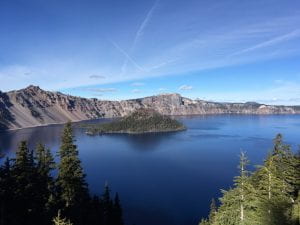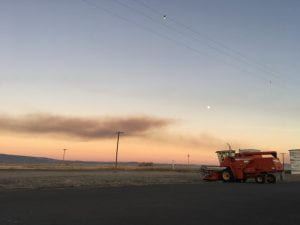By Lydia Ivanovic, Rural Tourism Coordinator, Discover Klamath
 Rural life is characterized is often characterized as slow and even at times stagnant, but then again many folks who don’t live in rural places don’t see the work that community members and the speed at which they can organize around the development of their hometown. In the wake of COVID-19, I have seen my community suffer economic losses that strain small town business and threaten the emerging tourism market. But, I have also borne witness to the very resilience that defines the Klamath Basin, and the opportunity to be a part of that. After the cancellation of the biggest outdoor recreation events for several small Oregon-California border towns, a $4 million loss to be precise, it seemed the bounce-back just wasn’t in our vocabulary. But, I was proven wrong. The event was rescheduled for a few more months out and we were on to the next, pushing along a marketing campaign, and installing the very first Quilt Barn panel on the Tulelake Cold Storage building, a shining beacon for the multi-panel quilt trail to come.
Rural life is characterized is often characterized as slow and even at times stagnant, but then again many folks who don’t live in rural places don’t see the work that community members and the speed at which they can organize around the development of their hometown. In the wake of COVID-19, I have seen my community suffer economic losses that strain small town business and threaten the emerging tourism market. But, I have also borne witness to the very resilience that defines the Klamath Basin, and the opportunity to be a part of that. After the cancellation of the biggest outdoor recreation events for several small Oregon-California border towns, a $4 million loss to be precise, it seemed the bounce-back just wasn’t in our vocabulary. But, I was proven wrong. The event was rescheduled for a few more months out and we were on to the next, pushing along a marketing campaign, and installing the very first Quilt Barn panel on the Tulelake Cold Storage building, a shining beacon for the multi-panel quilt trail to come.
I quickly adopted the Klamath Basin way and resilience became my M.O., too. No longer able to host the first ever community float event bringing visitors to our waterways? We now have the opportunity to construct an industry leading event for community members themselves to the float the waterways and engage in a multi-stakeholder conversation on what story we want to tell to visitors and lift the voices in our community through the connection we have with water.
 No longer able showcase local producers in food trucks at the upcoming Oktoberfest event? Instead, we will create the first local food guide in the Klamath Basin and take on individual outreach to connect farmers and foodies.
No longer able showcase local producers in food trucks at the upcoming Oktoberfest event? Instead, we will create the first local food guide in the Klamath Basin and take on individual outreach to connect farmers and foodies.
Maybe we can’t showcase the restaurant procuring local products in a highly trafficked restaurant weekend right now, but come fall time, an open air market might be just the thing to give local restaurants the spotlight they deserve.
In a matter of weeks, much of the work that I came to do in my community became impossible, stalled in the planning phase. But just as quickly, we came together to identify new gaps and “offline” opportunities and new strategies were put to the test. As a RARE member, I have been at the front lines of this creative thinking, leading all team meetings, researching regional examples of the work we want to accomplish, and always serving as a a point person for every comment, query, and the occasional complement.
 About the author, Lydia Ivanovic: Lydia completed her undergraduate studies at Smith College in western Massachusetts, majoring in Economics. Having worked on her school’s food sustainability campaign, Lydia is excited to see her food systems organizing skills put to work in developing the Basin’s agritourism network, among other projects. While Lydia hails from the big apple, she is excited to embrace the close-knit nature of rural communities and work alongside grassroots organizations to inspire real change. When not in the office, Lydia loves rock climbing, hiking, and playing the saxophone.
About the author, Lydia Ivanovic: Lydia completed her undergraduate studies at Smith College in western Massachusetts, majoring in Economics. Having worked on her school’s food sustainability campaign, Lydia is excited to see her food systems organizing skills put to work in developing the Basin’s agritourism network, among other projects. While Lydia hails from the big apple, she is excited to embrace the close-knit nature of rural communities and work alongside grassroots organizations to inspire real change. When not in the office, Lydia loves rock climbing, hiking, and playing the saxophone.
